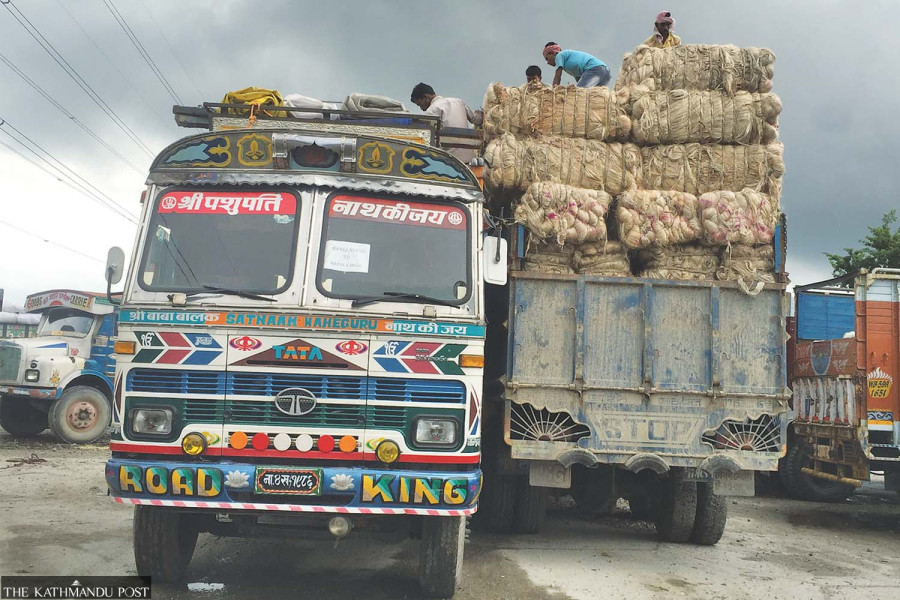Money
Cash subsidy raised to liven up moribund export
Minimum cash subsidy ranges from 4 to 8 percent as per revised guidelines.
Krishana Prasain
The government has increased the cash subsidy given to exporters in a bid to liven up Nepal's moribund export trade.
Exporters will get a minimum cash subsidy of 4–8 percent as per the Export Subsidy Work Procedure 2018 which has been put through a major overhaul, officials said.
“Any product whose export value exceeds Rs500 million annually and contains value addition as determined by the government is subject to an 8 percent subsidy. There is no list of eligible products,” Gobinda Bahadur Karki, joint secretary at the Ministry of Industry, Commerce and Supplies, told the Post.
The government has announced cash incentives of up to 8 percent for products like clinker, cement, steel, footwear and processed water besides information technology-related services and services related to business process outsourcing in the budget statement for the current fiscal year.
"The amended Export Subsidy Work Procedure 2018 will come into force after it is approved by the Cabinet and is published in the Nepal Gazette," Karki said.
"The revamped work procedure contains a provision to provide an extra 1 percent export subsidy depending on three criteria. These products are subject to an extra 1 percent export subsidy: One, products having a collective trademark like tea or pashmina. Two, listed farm products whose domestic value addition exceeds 30 percent and listed industrial products whose domestic value addition exceeds 50 percent. Three, products whose export volume increases by 30 percent year-on-year," he said.
Domestically produced textiles, readymade garments, carpets and woollen goods, Chyangra pashmina and other goods produced from it, jute and jute goods, gold and silver jewellery, semi-processed leather, medicines, felt products, polyester, fibre viscose, acrylic and cotton yarn and copper goods, handicraft goods, worshipping and decorative goods including utensils are subject to a cash subsidy of 4 percent. The subsidy was 3 percent previously.
The export subsidy on agricultural products like processed tea, coffee, handicraft and wooden craft goods, processed leather and related goods, handmade paper and related goods, processed herbs and oil, processed stone and stone jewellery, goods produced from allo and mineral water remains unchanged at 5 percent.
Goods like turmeric, vegetable, flower, processed honey, processed large cardamom, and processed ginger that are exported to third countries are also subject to an export subsidy of 5 percent.
Listed agricultural products should have value addition of a minimum of 50 percent. If value added is less than 30 percent, the product is subject to a 3 percent export subsidy. If value addition of a listed industrial product is more than 50 percent, it is subject to a 5 percent export subsidy.
"Manufacturers of cement and iron and steel have started exporting their products. They say that if they get a cash subsidy, they will be able to export their products to neighbouring countries," Karki said.
“We expect that the amended Export Subsidy Work Procedure and programmes inserted in the budget statement will increase exports.”
Trade experts say that even though the government has announced export incentives in the past, these inducements failed to yield the desired results as the country’s reliance on imports continued to grow. Products like carpets and ready-made garments should also be subject to incentives of 8 percent, they say.
According to the Department of Customs, Nepal’s export value soared by 41.74 percent year-on-year to Rs200 billion in the last fiscal year 2021-22. Imports swelled by 24.72 percent to Rs1.92 trillion in the same period.
Nepal’s trade deficit increased by 23 percent to Rs1.72 trillion in the last fiscal year compared to the previous fiscal year 2020-21.
“The export subsidy given in the past did not contribute to export growth, and this modality does not look like increasing exports either as nothing much has been changed,” said former commerce secretary Purushottam Ojha.
"Export subsidies should be granted on goods that have Nepali value addition, are produced domestically and generate employment. I think the time has come to go for a smart subsidy that supports production,” he said.
"Production subsidies can be given on inputs like transportation of raw materials. It will also help to control misuse of government subsidies," he said.
"Industry and trade entrepreneurs in Nepal are using loopholes to obtain the most benefit from subsidies, and the export of edible oils, betel nuts and legumes, among other products, is an example of this practice. So it has become important to go for a fool-proof system which does not have any loopholes."




 9.7°C Kathmandu
9.7°C Kathmandu















